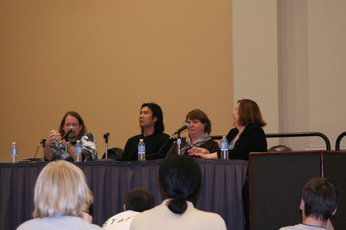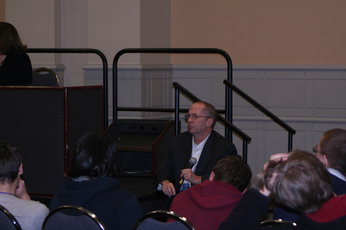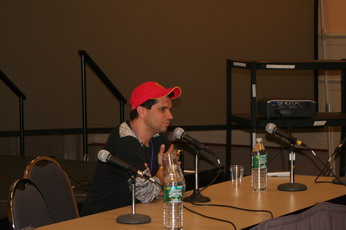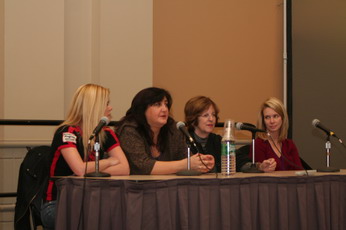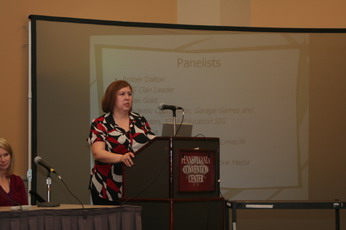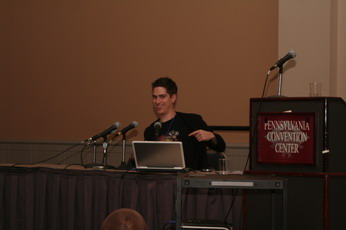Introduction
The VideoGames Expo (VGXPO) isn't a game development conference. Primarily, it's a gathering of game players mainly from around the tri-state area (PA, NJ, NY) but also in some part from around the country. Still, game developers are gamers at heart, so it made sense to at the same time have a Breaking In conference that focused on game development to be held within the gaming exposition itself. So that's the basic idea, and I trekked 1.5 hours from the eastern shore of Jersey out to Philadelphia, PA (Philly to the locals) to check it out both days, Saturday and Sunday. Obviously you can conclude based on the name of the conference that the focus of the various lectures were based on breaking into the game development industry. In that respect the conference did a fairly good job. All the speakers brought their industry expertise to the table or lecturn and gave their views and opinions about how easy or difficult breaking in is, ways to go about doing it, and how to strengthen your chances of getting a foot in the door. The sad part about it all was the lackluster attendance throughout the weekend. In a room easily meant to hold about 300 people, there were only roughly 40-50 on Saturday and that number dwindled to about 20-30 on Sunday. To put those numbers in perspective, my local IGDA chapter, which mainly caters to just the northern half of New Jersey, regularly drawns in about 30-40 people for meetings these days. Granted, we don't charge any admission fees, and getting into the Breaking In conference would have set a person back $100. However I see kids riding around today in low-slung Hondas and chromed out wheels. Minimum wage has risen, so even for a working high school student $100 wouldn't break the bank if they saved for a month or two. I did see a handful of young teenagers that were accompanied by parents, but the majority were college students. For an industry that everyone's dying to get into, it's weird seeing the lack of effort evidenced at an event like this. Perhaps it's in part due to the Internet that's making kids less and less reluctant to step out of their house and meet people face to face, and these events are the best oppurtunties to do so. I'm sorry to say it, but all of you who didn't attend this conference but could have, the people that were there are now one huge step ahead of you towards getting into the industry. That's a pretty bold statement sure, but for the most part it's absolutely true, and I'll be reiterating it in other ways as I go over what was discussed at some of the lectures.
I supposed I've rambled long enough for this to be a decent introduction. Once again keep in mind that the main focus of this conference was breaking into the industry, so if you're already in the industry you might not glean much knowledge from the following pages - and yet maybe you will.
Day One - Saturday
I arrived in Philly about 20 minutes early, and that was good because I was stuck in 15 minutes worth of traffic to go the one mile (if that) to the convention center. By the time I parked and found the conference, which was one of about three or four events being held in the huge convention center (easily comparable in size to Moscone West in San Fran), it was almost a quarter past the 10am start time. Luckily they were behind schedule setting up and the first session was delayed until around 10:30. However the keynote, which was given by Microsoft Game Studio's Director of Global Marketing, was about getting into video games marketing, which isn't really quite up our alley here at GDNet. So I left the room and wandered back upstairs to check out the huge expo hall, so big that the conference couldn't even fill the entire space. Like I said, this is primarily a gaming conference so they had nothing but games games and more games. Over 40 vintage arcade cabinets were clustered in two groups and open for free play. They had everything from Paperboy (I never even knew there was an arcade version) to Lunar Lander to Defender to Star Wars and games I never even heard of. Not only that, but NES, N64, Playstations, Wiis and Xboxes were also set up in areas around the floor playing classic games, and two LAN centers were hosting Crysis and Enemy Territory: Quake Wars. Various other booths had PCs running those two games and more, like the PC Guitar Hero III version, Portal and Team Fortress 2. Never have I seen such a gaming mecca, it's like dying and going to gamer heaven.
Breaking In Panel
But I didn't have much time to sit around and play. I indulged myself in a few favorite classics for nostalgia's sake and then spent most of the time taking pictures and running into people, like Tommy Tallarico, who was there to deliver a keynote the next day, and Susan Gold, who I had met out in Eugene for IndieGamesCon earlier last month and was speaking about getting into games education and women in game development. Before I knew it 11am had rolled around it was back downstairs to catch the next session, which was a panel moderated by Christopher Erhardt, VP of Production and Associate Dean / professor at DigiPen. The four panelists were
- Robin Chenoweth McShaffry, Co-founder and VP of Operations at Mary-Margaret
- Fiona Cherbak, VP of Marketing at Gamerecruiter
- Steve Reid, Manager/Director at Red Storm Entertainment
- Paul Chen, VP of Marketing at Marshall Media Inc.
The next question was aimed at the developer lifestyle, and the common misconception that the game industry is "loose" - that people have flexible hours and can dress however they want to work. Again Robin stepped up first to say how tough the game industry was, but then she turned to Steve and admitted that he's a pretty laid-back individual, and Steve smirked at that as he sat slumped back in his chair. He certainly looked laid back. When he sat up to speak into the mic he was still resting heavily on crossed arms. He agreed with Robin that the industry is a pretty tough grind stone, and detailed how they worked at Red Storm, which entailed the concept of "code hours". According to Steve developers were expected to be in the office coding from 10-4. Some came in early, some came in late and stayed later. So that's a little bit of flexibility. He also talked about playing games in the office, discussing "strategic" vs. "personal" game playing, where strategic game playing is obviously when a deveoper plays a game to study it or learn from it to apply towards their own projects and is more common than personal game playing in the office space.
So how about ways to increase your chances of landing that position? Well Fiona detailed the first step for you to perform, which is a self-assessment to determine exactly what it is you want to do in the industry. There are so many specialized fields these days that it is very easy to focus and get very good at a single one. Once you decide on this, it's passion and determination that take you the rest of the way. Also be sure that you're working on your communication and people skills as well, since you will have to work in a team envrionment. Take on public speaking, group projects and look for internship positions. Remember that your skills as a developer can only take you part of the way. The final question Steve has his employees ask themselves about potential hires is "do I want to work with you?". If you can't get along with people, your skills are completely and utterly worthless.
What are some good entry-level positions? Robin listed several, including internships, Quality Assurance (Q/A, or game testing), P/R and Marketing, and junior-level positions sometimes advertised by companies (junior programmer, junior artist, junior level designer, etc). if you're looking to become a programmer, Steve says to make sure you're ready to receive a tech test and have studied in the language that the studio you're applying for is working in. Said Robin, Designers generally include writing samples and game mods in their portfolios. Artists, besides having a ton of drawings in their portfolio (which should be tailored to the game studio you are applying for) should continually seek to improve their craft by drawing each and every day. Everyone on the panel agreed with this last point.
The floor was opened for Q&A and a line of people formed behind the floor mic. The first question was what books were good for people looking to break in, and Fiona listed Paid to Play and Get in the Game as two personal favorites. Another question asked what fields are most available. Steve responded by saying that at Red Storm they had like 50 artists, 30 engineers, 12 designers and 4 producers - so the answer there was anything involving asset production was on the upswing. Next question asked what the biggest mistakes were in interviews, and Paul's response was the first impression. "You have 30 seconds" he said about making that first impression a good one, so make sure you give a strong handshake and look the person directly in the eye. Fiona's advice was to not place your student status (if you are a student) at the top of your resume, or people will read the rest while considering you as a student. The following question was whether or not you should move to a city (like LA or San Fran or Austin) before trying to find a job. Steve responded saying that if there was a good chance of getting a job, or you're sure of landing a job, moving first would make you more favorable. A good way to judge yourself is to look at the games the company had recently shipped and ask yourself whether your work is as good or better than what they produced. Finally, a question was asked about interview materials. Fiona sad for artists mainly 3DS Max and Maya work should be included in the demo reel, with multiple samples showing improving skill and the use of tools to show you are keeping up with the fast emerging technology. Paul suggested that you try to tell a story with your reel as much as possible to capture people's attention. Robin suggested that you show flexibility in your work, like being able to design models in both low and high poly. In terms of programmers submitting code, Steve suggested that the code be focused and targeted towards the position you are applying for (don't send them an entire game engine for an AI position). It doesn't need to be a full game or have to reflect on any of your past projects. Furthermore, the code sample could carry you through to success if you're easy to talk with but people have trouble getting a read off you in terms of skill.
Calling it a day
Unfortunately that was the meat of the first day. There was a session on games education but I decided to skip it in favor of catching the screening of Spencer Halpin's Moral Kombat. By the time I walked out of that the lecture was finished, and after that they only had a resume review session. As for the movie, I walked out after realizing it was just the same old trash I've been hearing the past few years; There was nothing ground-breaking about it or anything that would lead people to believe games aren't the cause of violent behavior. Anyone who watched this video would leave with their own opinions completely intact, it was quite pointless. Apparently later in the day the had Jack Thompson himself appearing in the same theater for an open debate session. The line stretched almost the length of the entire hallway, and huge bodyguards were handing out Code of Conduct flyers to all the attendees and searching through everyone's bags upon admittance. I hear the debate didn't get out of hand, and as far as I know no one was ejected. I spent my time in the expo, checking out games.
Day Two - Sunday
Tommy Tallarico Keynote
Today was more filling, starting out early in the morning with a keynote from Tommy Tallarico, a veteran of the games industry since 1991. There were only a small handful of people filling the huge room, so Tommy took a chair at the table on the floor and had everyone move up and cluster around the front so he wouldn't need to use the microphone, although the audio guy ended up turning it on anyway. Regardless the point was that there were only about 30 people there to receive some valuable industry advice.
Tommy opened up with his own opinion about breaking into the games industry which is that it's "actually really easy to get in". Of all the entertainment industries, Tommy said, games are probably the easiest to get your foot in the door, unlike film (movies/TV) and music. A lot of people think they need a ton of talent in order to make it into the industry, but this isn't true. Talent will help you to suceed, but it's only half of the equation. The other half is networking, which Tommy stresses as being the more important half as meeting people will open up oppurtunities for you to get yourself in front of the right person to hire you.
To give an example, Tommy told us about how he ended up getting involved in the games industry. He was always into music as a kid, as well as being an avid game player. It wasn't until he saw an ad one day that he realized you could actually combine the two and make music for games. The concept blew his mind (as it does to most of us as kids when we realize that we can someday make the kind of games we loved to play as youngsters) and when he turned 21 he left his mother, father and brother crying on the doorstep at their home in Massachusetts and took off for California to work in the games industry. He arrived in LA and after his first day wandering around all he could ask himself is "what have I done?" as the full realization of what it meant to be on the other side of the country with no money, no family and no job actually meant. For the first two weeks in California he was literally sleeping under the pier at Huntington Beach after he drove out to Orange County. There he picked up a paper to search for jobs and found one at a music store selling guitars. Confident he could use that to get by until he landed his gaming gig, he went in to interview and they told him "sure, you can start the next day". Well the next day rolls around and Tommy shows up to work wearing a Turbo Graphics 16 t-shirt. Now, let's think back to 1991 and ask ourselves, "how many game t-shirts were there back then?" if you said little to nil, then you're right. As fate would have it, The very first customer coming into the store that Tommy helped out was a producer at Virgin who was starting up a new game development division. Seeing Tommy's t-shirt he immediately struck up a conversation and Tommy was offered a job on the spot to become Virgin's first game tester. He could start the next day.
Let's do a reality check real quick though, and realize that this was back in 1991. Instead of being inundated with tons and tons of applications, studios were searching long and hard for proper game developers to help them succeed in this industry that was only just starting to pick up speed on the PC market. Could you do such a thing today with the same amount of success? Sure. Just don't kid yourself by thinking it can happen right away. As fortunate as Tommy was to be in the right place at the right time, it's not something that happens to everyone. Although there are definitely things that you can do to increase your chances.
The first thing that has to happen is you need to decide what it is that you want to do in the industry. Start broad, ask yourself if you want to be an artist, designer, musician or programmer. Next decide what kind of artist, designer, musician or programmer you want to be. There are so many individual fields within these disciplines that it is in your best interest to choose one and become very good at it. For example, there's now a position in the audio field called a Music Supervisor at studios like Acclaim and EA, whose job is to go out and find licensed music for a game and oversee the licensing rights for securing that music. Two years ago Tommy had never heard of such a thing. The same holds true for art (concept artist, 3D modeler, texturer, etc), programming (tools, AI, systems, etc), and design (story writer, level design, character design, etc). As the industry continues to grow and expand, keep your eyes open for new niche positions.
Once you've discovered your specific vocation, you have to pursue it with passion. Passion and love for the games industry overwhelms creativity, you don't neccessarily have to prove your creative nature to someone so long as they can see that you are passionate and in love with creating games. When Tommy wore that t-shirt to work he was expressing a love for gaming in a way that was uncommon back then, and that was picked up on by the Virgin producer. One way to prove your passion and perhaps the most popular doorway into the industry is game testing. Would you like to know how the CEO of Blizzard Entertainment got starting in the industry? I'm sure you can probably guess the answer, which is he used to be a game tester at Virgin right next to Tommy. Get yourself hired into the testing department of a studio you want to work for and every now and then say "hey I had some concept ideas for a character in this game" or "you know I whipped up this little tool for adding assets to the world at runtime" or "I have this little sub-plot sketch for the seventh mission scenario" or "I made some new sound effects for the tenth level". Show people that you're willing to work outside of your role, which denotes passion, and you may get hired on full time.
Going back to Tommy's more important topic, networking is really the key to all of what you read above. These days it's easier than ever to meet other game developers (we really are a very friendly bunch and don't bite) and networking is still yet another way to show your passion for game development. If a student empties out his life savings to buy plane tickets to California and a pass to attend the GDC, that's a pretty bold statement right there, and you can believe that it will have an effect on people. "Wow this kid flew all the way out here to hand us his portfolio and resume in person? And he's a pretty nice guy too, I can see getting along and working with him." Imagine than compared to someone reviewing a mailed-in resume from a person who they've never actually met before. So, what if you're a bit of an introvert who doesn't like going out and meeting people in person? Well Tommy suggested a great book to help with that entitled "How to Win Friends and Influence People".
Finally, here are some links to organizations and gatherings that Tommy suggested:
- The Game Developers Conference
- GameJobs.com
- Gamasutra Jobs
- The International Game Developers Association
- Entertainment Consumers Association
- Entertainment Software Association
- Game Audio Network Guild
Women In Games Panel
This panel was moderated by Fiona Cherbak from Women in Games International, and was chaired by the following panelists:
- Amber Dalton, PMS Clan Leader
- Gano Haine, VP of Development at Limelife
- Jennifer MacLean, General Manager or Games at COmcast interactive Media
- Susan Gold, Chairperson of the IGDA Education SIG
Once that subject was breached, Jennifer hopped in saying that women have to establish gaming cred and create a common connection with men right away. She says she commonly receives the "you don't look like a gamer" opinion and her response to that is to immediately start listing the games she's played and using the lingo and jargon common to game players. Gano had a different story, stemming back to being laid off from EA several years ago, and taking about 5-6 years to work her way back into the industry. "It takes time" she said. Amber from Clan PMS agreed with Jennifer on the credibility issue, saying that a lot of women are competitors who don't think they are.
Women generally work harder then men, and according to Amber this is the fact that women want to feel that they are needed and want to prove themselves. One of the audience members brought this up when he said that of all the team members he worked with, he could always rely more on the women to return his calls, keep him up to date, etc. Gano's view was that women aren't generally seen as needing to make money, so they're not so fast to leave a job if times get rough and pay is short, which makes them appear more tenacious. Another benefit to having women on the team is that it greatly increases the diversity and brings a whole new perspective to a game project.
It's unfortunate that there were not many women in the audience to take advantage of this panel. Besides Amber's Clanmates there were maybe two or three women sitting in the room. This only proves that we still have a lot more work to do to get the next generation of women actively involved in the games industry.
Breaking into the Games Industry in Three "easy" Steps
The last session I attended today was given by Coray Seifert from THQ's Kaos Studios, located in NYC. Coray started off by attending local chapter meetings of the IGDA back around 2002. Through networking, Coray landed his first job with the US Air Force, later moving on to Large Animal Games and finally ending up at Kaos Studios. The main thing to note of all this is that Coray found all his jobs through people he knew. In his lecture, Coray covered three steps aspiring game developers should follow towards getting a job in the industry:
- Play the industry game
- Master tools of the trade
- Find a path and follow it
The first step is to get involved in the industry to show you are a motivated individual who is serious about become a game developer. One of the best ways to do this is to become a member of the leading game industry group, the IGDA. Similar groups also exist, like the ESA and the ECA, but the IGDA is strictly for game developers. One of the main reasons to do something like this is to network with people. An old adage states that "it's not what you know, it's who you know", and I like to take that a step further by saying "it's not who you know, it's who knows you". It's very easy to come full circle in this industry. If you make enough contacts, someone you never even met before may send you an email saying "Hey I saw you're friends with Rick and do AI programming. I'm looking for someone with your skills, contact me." Now that's cool. Also never forget that jobs in the industry are more often than not filled without ever being listed anywhere - someone simply knows a good person for the position and offers it to them directly. one of the best ways to get involved with the IGDA and show your passion through volunteerism is to be involved in a Special Interest Group, or SIG. Placing your IGDA member number on your resume is also a good idea.
As said before, attending conferences is invaluable to the budding game developer. Again not just for information, like attending lectures to expand your knowledge base, but to learn how to talk the talk and gain new friends in the industry. Through them you can gain industry insight on pertinent matters as well as insight and inspiration into your own games or ideas. Conferences are wonderful meeting locations - they always have tables around that are big enough for like 12 people which you can sit at and start talking to others around you. Bar areas and parties are common and the social environment of both make people a lot more open to discussions.
Finally, be active on forums and websites to learn new skills and further expand your network. The IGDA forums, the David Perry Forums and the ones here on GDNet were all recommended by Coray. He also listed a few websites:
Master tools of the trade
One of the big topics these days is whether it's worth it to go to college for an education before hopping into the games industry. With the Internet, so much information is available that it's easier to learn the skills you need without having to go to college. That said, a college degree is still a valuable thing, even if it's usually not required in game development, although studios are looking for degree-holders more these days than they used to. At the very least a college degree shows that you are able to stick through with something until the end, which is a very important thing to have for game development, as projects can sometimes drag on for what will seem like eternity. This means you can go ahead and take that liberal arts degree, there are tons of people working in the industry today with degrees so far away from anything related to game development it's astounding, which is further proof that people are mainly looking for that drive to completion. Besides the industry-targeted colleges like SMU, DigiPen and Fullsail (to name just the most popular), regular colleges these days have flexible schedules that let you work on ways to expand your skills in the downtime, and talk to an advisor as well about tailoring your education to fit with game development.
The most important thing however is to come away from college with something more to show for it than just a degree. Nothing replaces experience and that's the number one thing developers will be looking for in new hires. Several ways to gain this experience is to make a mod of your favorite game. There have been mod teams that have been hired outright (Valve's aquisition of the Team Fortress modders is a great example), and working on a mod is a great way to gain experience not only for yourself but in working with other team members on a project. Mods also teach you about game tools and are very easy to get involved in. Indie projects are also a great way to learn and gain experience in teamwork. Many indie projects are unpaid, so it's best to take them on while in school and not out in the real world, jobless and starving. It's another way to show your passion and love for game development, working on a game for free in your spare time. Even if you take on an ambitious project that is never fully completed, you'll have learned something. One final way is to become a beta tester, and from there work your way up to a game tester, as has been said many times before.
Find a path and follow it
Knowing what you want to do in the industry (check out the Tommy Tallarico keynote if you skipped it), the next step is to find the studio that best suits your needs and is looking for your skill set. Remember you're looking for a good work environment as well as a team that's working on titles you're interested in developing. Tailor your resume to fit the studio, taking into account things like its size, genre and production style. Reflect this focus also on your cover letter, and remember that any and all experience is invaluable, so make sure to list everything, expecially if you beta tested one of their games.
You can even go a step further and work on mastering the games that have been put out by the studio, or the games put out by the studio's direct competitor. This will give you a lot to talk about when you go in for an interview as a way to showcase analytical skills. It will also show that you know and understand the genre that the studio is working in, which will give them confidence that you will carry the vision of the titles properly to the target audience. If you've spent enough time playing a game to have ranked or competed in tournaments, it's okay to list those achievements on your resume towards the bottom, as it will show that you're driven to play games the company is making, which is more often than not a direct correlation to developing those types of games.
Stick with it!!!
Not everyone gets to where they want to be immediately. It can take months or years (many years) to become the lead designer you want to be, or the production manager that you want to be. The important thing is to continually strive to improve yourself, and work hard to keep pace with this rapidly evolving industry.
Image Gallery
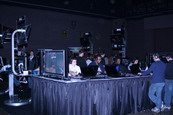 |  | 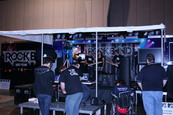 |
 |  |  |
 |  |  |
 | 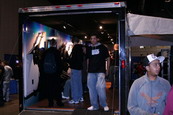 | 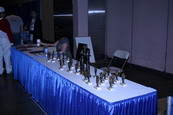 |
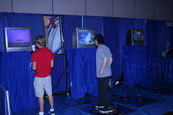 |  |  |
 | 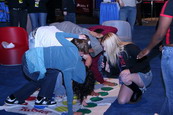 | 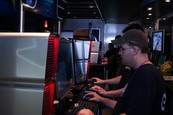 |
 |  |  |
 |  | 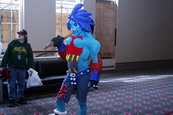 |
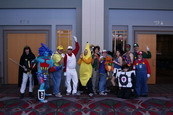 |



